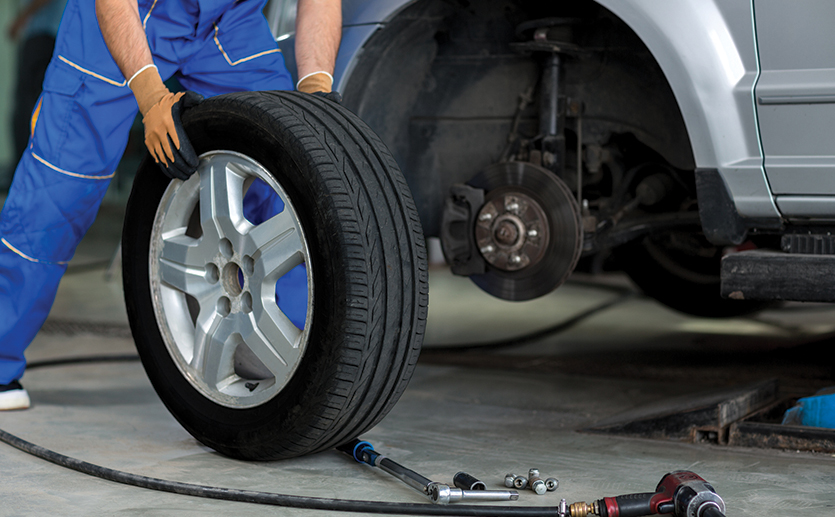Experience Precision with GMC Tire Service at Morris Tires
Experience Precision with GMC Tire Service at Morris Tires
Blog Article
Tire Solution: The Effect of Weather Condition Conditions
When it involves ensuring optimal performance and safety and security when driving, understanding the impact of climate problems on tire service is vital. From scorching warm to icy roads, each weather condition aspect can dramatically influence tire performance and total driving experience. By diving right into the results of varying climate condition on tires, motorists can acquire beneficial understandings that may enhance their vehicle's performance and durability. In this discussion, we will certainly discover the complex relationship between climate condition and tire solution, shedding light on the relevance of weather-specific tire maintenance techniques and considerations.
Heat and Tire Performance
When subjected to high temperature levels, tires experience modifications in performance that can significantly impact vehicle security and handling. The warmth produced from long term driving or hot climate problems causes the tire rubber to soften, leading to minimized tread life and raised wear.

Cold Climate Effects
Cold weather condition conditions can have a considerable effect on tire efficiency and security. As temperature levels decline, tire rubber can solidify, resulting in decreased grip on icy or snow-covered roads. In cool weather, tires might additionally shed atmospheric pressure extra rapidly, which can influence taking care of and fuel effectiveness. In addition, cold temperature levels can create tire sidewalls to stiffen, raising the danger of damage from gaps or various other roadway dangers.
To reduce the results of winter on tires, it is critical to on a regular basis inspect tire stress and inflate them to the supplier's advised levels. Making use of winter or all-season tires designed for winter conditions can additionally improve grip and grip on icy or snowy roadways. Correct tire upkeep, consisting of regular inspections for wear and damages, becomes a lot more important during cooler months to make sure ideal performance and safety and security.
Rainy Issues Influence
Tires with worn-out treads are a lot more vulnerable to hydroplaning, where a layer of water constructs up in between the tire and the roadway surface area, leading to loss of grip. To battle this, vehicle drivers need to routinely examine their tires for adequate tread depth and take into consideration spending in tires especially developed for damp problems.
Additionally, rainy weather condition can additionally lower exposure, making it testing for motorists to see the road ahead plainly (GMC Tire Extra resources Service). In such conditions, it is essential to adjust driving rates appropriately and keep a secure following range to enable sudden stops. Appropriately filled with air tires can additionally aid in preserving control on wet roadways by offering better handling and grip
Snow and Tire Security
Snow-covered roadways position distinct difficulties for drivers, highlighting the significance of appropriate tire option and maintenance. When driving in snowy conditions, having the best tires can make a considerable distinction in security and performance. Winter months tires are created with unique rubber substances and walk patterns to supply far better traction on snow and ice contrasted to all-season tires. The much deeper treads and sipes of winter tires assist grip the roadway better, minimizing the risk of gliding and sliding.

Additionally, vehicle drivers need to consider mounting tire chains in severe snowy problems. Tire chains provide additional traction by clutching the look these up snow and ice, improving stability and control. Nonetheless, it is very important to adhere to maker guidelines when setting up and making use of tire chains to stop damage to the tires and automobile. By selecting the best tires, preserving appropriate inflation, and taking into consideration extra traction aids like tire chains, chauffeurs can boost their security when navigating snow-covered roads.
Weather-Related Tire Upkeep
Weather-related tire maintenance incorporates an array of techniques intended at making sure optimal tire feature and durability in various climate situations. One vital aspect of weather-related tire maintenance is tire stress regulation. Examining tire step frequently and replacing tires when step wear gets to a specific deepness is vital for preserving traction and security in negative weather condition.
Final Thought
Finally, climate conditions have a substantial influence on tire performance and security. From heat influencing tire stress and use to cold weather decreasing grip, it is necessary to think about the weather condition when keeping and making use of tires. Wet conditions can reduce hold and bring about hydroplaning, while snow can boost the danger of crashes if tires are not correctly furnished. go to this site Weather-related tire upkeep is critical in ensuring ideal performance and safety and security when driving.
In this discussion, we will explore the complex relationship in between climate problems and tire solution, shedding light on the importance of weather-specific tire upkeep practices and factors to consider.

Report this page